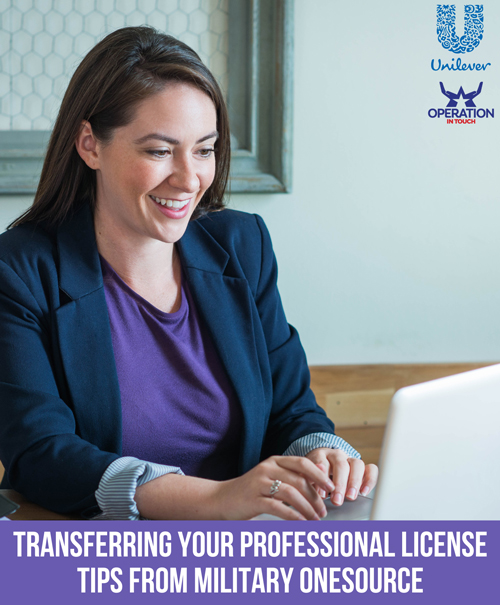
Transferring Your Professional License
Moving across the country – or around the world – can be a great adventure. Here’s some help for making sure your licenses and certifications travel with you during your next move. (All links below open in new windows.)
Your service branch will help reimburse licensure costs that come up when you PCS. Plus, the Department of Defense’s Defense-State Liaison Office and Spouse Education and Career Opportunities program worked to streamline state licensing procedures to make it easier for military spouses to find a job.
About spouse licensure reimbursement policies
The 2018 National Defense Authorization Act allows each service branch to reimburse spouses up to $1,000 for relicensure and certification costs resulting from relocations or PCS moves that cross U.S. state lines – to include OCONUS to stateside moves.
Click here to find your sponsoring service branch for details on how to apply for your reimbursement.
About state-sponsored reciprocal agreements
Because of the delays and expense involved in re-licensure, many states have implemented or are in the process of implementing license portability measures for military spouses that may include expedited applications, temporary licenses, or license reciprocity. Visit the Department of Labor Military Spouse Interstate License Recognition Options for up-to-date legislation and licensure information for your specific state.
Depending on your work, state-sponsored reciprocal agreements can help reduce or eliminate the relicensing process in your new state. If the process turns out to be lengthy or costly, you may be eligible for unemployment compensation. Your state’s employment office can offer more details.
Transferring your teaching license
Licensing requirements for teachers vary by state, but some states will issue a provisional license if you have a license from another state.
- The National Association of State Directors of Teacher Education and Certification administers an agreement that helps teachers transfer their credentials within member states. Visit its Interstate Agreement page for details.
- Department of Defense schools overseas accept teaching licenses from any state or territory as long as the teaching categories are marked on the license.
Health care professions
- Nursing: All states require licensing for registered nurses and licensed practical nurses. Many participate in the Nurse Licensure Compact, which allows nurses to practice with a multistate license. See the National Council of State Boards of Nursing.
- Nurse practitioner: Although licensing requirements vary by state, there is a national certification offered by the American Academy of Nurse Practitioners.
- Physical therapist: All states require licensing. Some expedite licensing for military spouses moving into their state. Visit the American Physical Therapy Association.
- Medical transcriptionist: Most states don’t require licensing or certification. Visit the Association for Healthcare Documentation Integrity for information about voluntary credentials.
- Physician assistant: All states require a license, but rules vary. See the National Commission on Certification of Physician’s Assistants.
- Emergency medical technician and paramedic: All states require some type of license or certification. Check with the National Registry of Emergency Medical Technicians for national certifications.
Other occupations
- Attorney: The Military Spouse JD Network advocates for licensing accommodations for military spouses in each state.
- Child care worker: Many employers prefer to hire workers who have earned a nationally recognized designation. See the National Child Care Association.
- Cosmetologist: (includes hair stylists, barbers, nail technicians and skin care specialists): While states have varying licensing requirements, the National-Interstate Council of State Boards of Cosmetology offers a national testing program.
- Massage therapist: Many states require some type of credential. Visit the American Massage Therapy Association and the Federation of State Massage Therapy Boards.
- Paralegal: Credentials are not required in most states, although a nationally recognized certification through the National Association of Legal Assistants may offer an advantage when looking for a new job.
- Real estate agent: Licenses are required in every state. The National Association of Realtors has a listing of state and local real estate boards, with details on state licensing requirements and reciprocity agreements.
- Social worker: All states require some type of license or registration, but requirements vary. Nationally recognized agencies offer credentials that may transfer between states. See the Association of Social Work Boards for more.
Licensing overseas
In some occupations, your state-issued license — no matter where it’s from — is valid for government and contracting jobs. To learn more about transferring certifications overseas, check with that installation’s hiring authority.
More tips for transferring certifications
The Department of Defense is committed to making it easier for military spouses to find and follow a meaningful career.
- Find information about the progress of licensing issues that affect military spouses in your state on the Defense-State Liaison Office’s website, Military State Policy Source. DSLO partners with state policymakers and leaders to help reduce or eliminate licensing barriers for military spouses as they move with the military.
- Connect with other military spouses on the Blue Star Networks to share professional information and get the scoop on state licensing requirements.
- Identify occupations with good job portability. Search for open positions with hundreds of employers committed to hiring military spouses through the Military Spouse Employment Partnership Job Search on MySECO.
Read the original article by clicking here. (Link opens in new window.)


